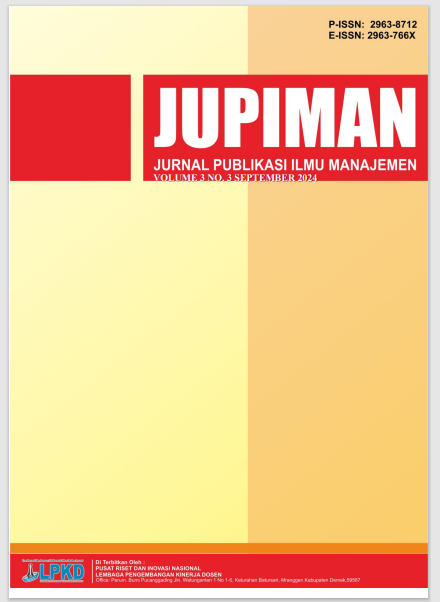Persepsi dan Preferensi Pekerja Biasa Terhadap Dana Pensiun Sebagai Perencanaan Hari Tua
DOI:
https://doi.org/10.55606/jupiman.v4i2.5002Keywords:
Ordinary Workers, Pension Funds, Perceptions, PreferencesAbstract
This study aims to explore the perceptions and preferences of ordinary workers in Jakarta regarding pension funds as a means of old-age financial planning. The research employs a survey method involving 100 respondents from various informal and formal employment sectors categorized as ordinary workers. The study focuses on three main aspects: ownership of pension savings, ability to contribute to pension funds, and the method of access preferred for purchasing pension products. The findings reveal that 64% of ordinary workers currently do not possess any retirement savings, indicating a lack of awareness or prioritization of long-term financial planning. Additionally, 77% of respondents reported that they are only capable of saving Rp. 500,000 or less per month for retirement purposes, which reflects limited financial capacity and competing daily financial needs. Furthermore, the survey found that 51% of respondents showed a preference for purchasing pension funds online, suggesting a growing acceptance of digital platforms in financial decision-making. Despite the evident need for future financial security, the overall perception and preference toward pension funds remain low among ordinary workers. This is mainly due to a lack of awareness, insufficient income, and a perceived complexity in accessing and understanding pension products. To improve participation rates, the study recommends the implementation of widespread and continuous education campaigns on the importance of retirement planning, particularly targeting low-income workers. Moreover, enhancing digital access to pension fund products can significantly boost inclusion by simplifying the purchasing process. The study concludes that pension funds, if properly promoted and made accessible, have the potential to become a viable instrument for ensuring income continuity for workers in their retirement years.
Downloads
References
Andersen, T. M. (2024). Pension reform and wealth inequality: Theory and evidence. European Economic Review, 165, 104746. https://doi.org/10.1016/j.euroecorev.2024.104746
Artoyo, A. R. (1986). Tenaga kerja perusahaan menurut pengertian dan perannya. Jakarta: Balai Pustaka.
Fariana, A. (2021). Aspek legal sumber daya manusia menurut hukum ketenagakerjaan. Jakarta: Mitra Wacana Media.
International Labour Organization (ILO). (n.d.). Pensions. https://www.ilo.org/universal-social-protection-department/areas-work-social-protection-department/policy-development-and-applied-research/pensions (Diakses 26 Maret 2025)
Otoritas Jasa Keuangan. (2023). Peraturan OJK (POJK) No. 27 Tahun 2023 tentang Penyelenggaraan Usaha Dana Pensiun. Jakarta: OJK.
Pemerintah Indonesia. (2023). Undang-Undang Republik Indonesia Nomor 4 Tahun 2023 tentang Pengembangan dan Penguatan Sektor Keuangan. Jakarta: Sekretariat Negara.
Peraturan Menteri Ketenagakerjaan Republik Indonesia Nomor 28 Tahun 2014 tentang Tata Cara Penyelenggaraan Program Jaminan Pensiun.
Simanjuntak, P. J. (1985). Pengantar ekonomi sumber daya manusia. Jakarta: Fakultas Ekonomi Universitas Indonesia.
SMBCI. (2024). 5 fungsi dana pensiun yang perlu Anda ketahui. https://www.smbci.com/id/berita-media/blog/Keuangan/5-fungsi-dana-pensiun-yang-perlu-anda-ketahui
The Ambachtsheer Letter. (2024, Maret). A pragmatic theory of ‘pension fund capitalism’: Implications for managing pension organizations. https://kpa-advisory.com/userfiles/Ambachtsheer_Letter_August_2024.pdf
Warr, P. (1987). Work, unemployment, and mental health. Oxford University Press.
Yunus, S. (2019, Juli 22). Opini: Edukasi dana pensiun terabaikan. Bisnis.com. https://finansial.bisnis.com/read/20190722/215/1127097/opini-edukasi-dana-pensiun-terabaikan-
Yunus, S. (2024, Desember 17). Opini: Empat tantangan besar industri dana pensiun di era digital. Bogor-Kita. https://bogor-kita.com/opini-empat-tantangan-besar-industri-dana-pensiun-di-era-digital/
Yunus, S. (2024, Desember 21). Bila edukasi dan digitalisasi, akumulasi dana pensiun bisa 20 persen dari PDB. Kumparan. https://kumparan.com/syarif-yunus/bila-edukasi-dan-digitalisasi-akumulasi-dana-pensiun-bisa-20-persen-dari-pdb-23S1RBxhIsP
Yunus, S. (2024, Februari 20). Apa itu DPLK? Kompasiana. https://www.kompasiana.com
Downloads
Published
How to Cite
Issue
Section
License
Copyright (c) 2025 Jurnal Publikasi Ilmu Manajemen

This work is licensed under a Creative Commons Attribution-ShareAlike 4.0 International License.








